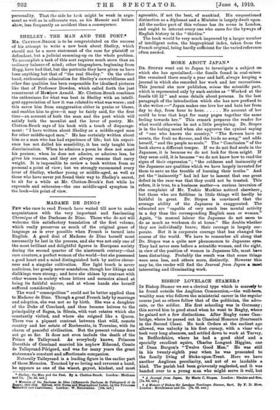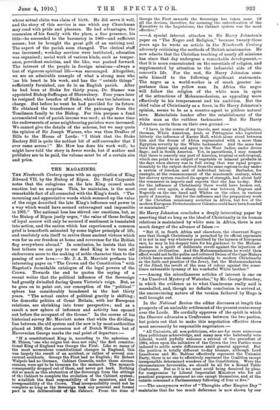BISHOP LOVELACE STAMER.f IN Bishop Stamer we see a clerical
type which is scarcely to he found outside the Anglican Communion,—the well-born, wealthy man who follows the ministerial career in the regular course just as others follow that of the politician, the advo- cate, or the soldier. His first schooling was in Germany; this served him in good stead when he went to Rugby, where he gained not a few distinctions. After Rugby came Cam- bridge, where he passed out in Classical Honours (fourteenth in the Second Class). He took Orders at the earliest age allowed, was unlucky in his first curacy, with a vicar who took very long absences, and settled down to work at Turvey, in Bedfordshire, where he had a good chief and a specially excellent squire, Charles Longuet Higgins, one of Dean Burgon's " Twelve Good Men." He was still in his twenty-eighth year when he was presented to the family living of Stoke-upon-Trent. Here we have another Anglican peculiarity, and not of so laadable a kind. The parish had been grievously neglected, and it was handed over to a young man who might serve it well, but
• A Journal from Japan. By Marie C. Stopes. London : Blackie and Son. [7s. 6d. net.] t A Memoir of Bishop Sir Lovelace Tomlinson Starner, Bart. By E. D. How. London : Hutchinson and Co. [7s. 6d. net.]
whose actual claim was claim of birth. He did serve it well, and the story of this service is one which any Churchman may read with pride and pleasure. He had advantages, the connexion of his family with the place, a fine presence, his title—he succeeded to the baronetcy in 1860—and sufficient means ; but be brought the great gift of an untiring zeal. The aspect of the parish soon changed. The clerical staff was increased ; weekday services were instituted; education was organised ; social work of various kinds, such as temper- ance, provident societies, and the like, was pushed forward. The interest of the people in foreign missions—always a test of vigorous spiritual life—was encouraged. Altogether, we see an admirable example of what a strong man who ':as his heart in his work, and has the " outside things" sufficiently furnished, can do in an English parish. After he had been at Stoke for thirty years, Dr. Starner was appointed Bishop Suffragan of Shrewsbury. Four years later be resigned the benefice of Stoke, which was too laborious a charge. But before he went he had provided for its future. He obtained the transference of the patronage from the Tomlinson family to the Bishop. For this purpose a fund accumulated out of parish income was used ; at the same time the endowments of some neighbouring parishes were increased. We cannot give the details of the scheme, but we may quote the opinion of Sir Joseph Warner, who was then Drafter of Bills to the House of Lords: " I think that the Stoke Rectory Bill is quite the noblest bit of self-surrender that I ever came across !" Mr. How has done his work well; he might have told the story in fewer words, but if author and publisher are to be paid, the volume must be of a certain size and price.



















































 Previous page
Previous page